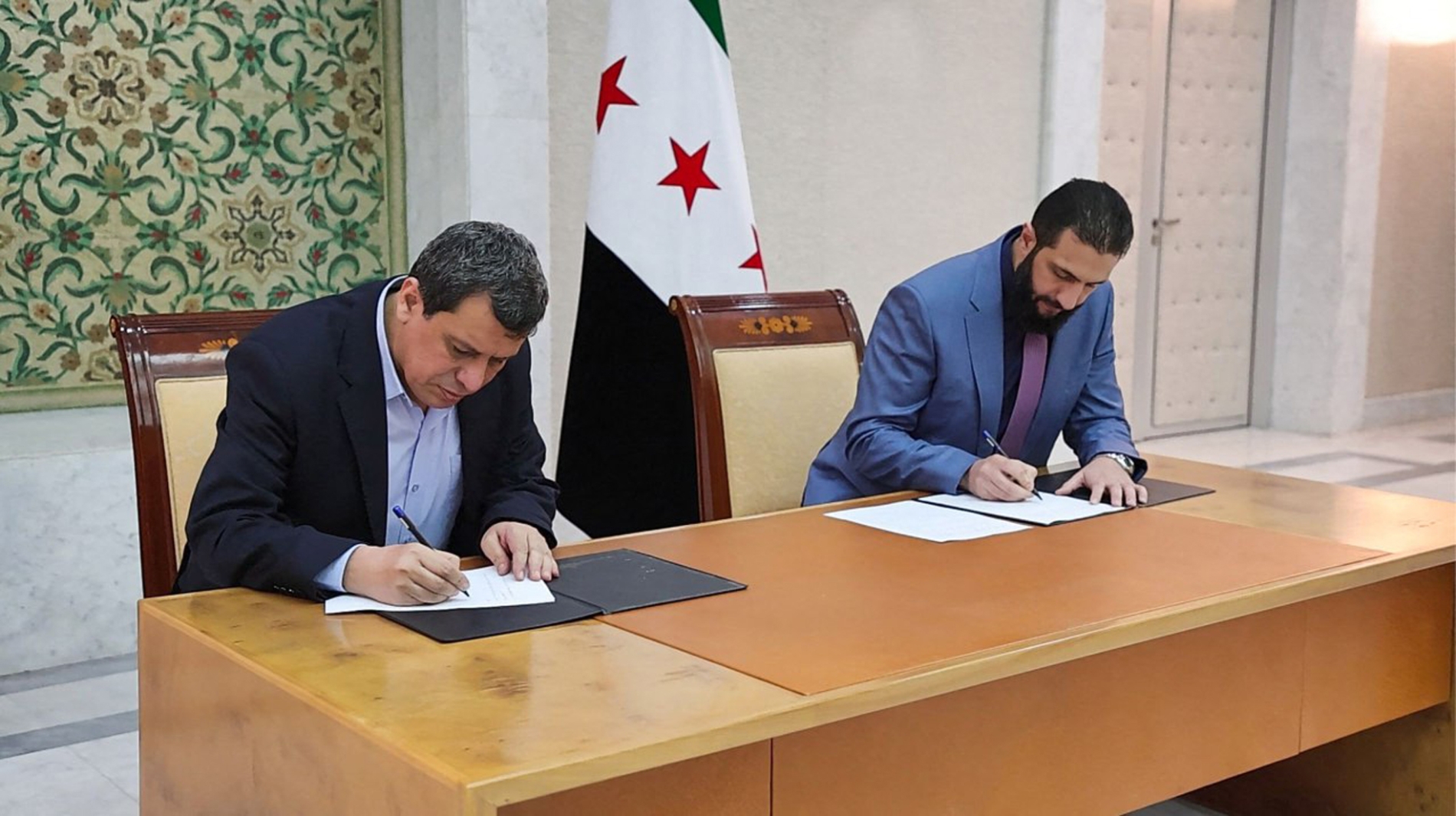Syria’s interim president, Ahmed al-Sharaa, drew a crowd in much the same way as a celebrity during his recent visit to Türkiye, his second in an official capacity. There to attend the Antalya Diplomacy Forum, he met Turkish President Recep Tayyip Erdoğan on 12 April. He also met Qatar’s Prime Minister, Sheikh Mohammed bin Abdurrahman Al Thani, another major supporter of his.
The official statement released after Erdoğan met al-Sharaa was full of official platitudes, reaffirming Türkiye’s efforts to lift the international sanctions against Syria and revitalise trade and economic cooperation between the two countries.
No mention was made of the security issues of mutual concern, although these will undoubtedly have been discussed, not least in relation to the armed Kurdish groups in Syria’s north-east, with whom al-Sharaa reached an agreement in March. After the forum, al-Sharaa flew straight to Abu Dhabi to meet the UAE leader, Sheikh Mohammed bin Zayed Al Nahyan.
Uniting Syria
Syria’s challenges remain complex and many. Al-Sharaa is in the process of building a new political and administrative structure that includes Syria’s many minorities, bringing its armed groups under the control of the Ministry of Defence, forming a new national army, and rebuilding the economy to begin to raise the standard of living for Syrians.
Among the minorities with whom Syria's new administration has spoken to are the Kurds, Druze, and Alawites—the latter having been killed in the hundreds over three days of intense fighting and mass killings in March. The Assads, who ruled Syria for decades, were Alawites.
On 10 March, three days before his government approved an interim constitution, al-Sharaa met Mazloum Abdi, commander of the Kurdish-led Syrian Democratic Forces (SDF), which currently controls much of Syria’s oil-rich north-east.
Some had feared that the US-backed SDF would outright refuse to relinquish any of its current autonomy or oil revenues, but the two men, in fact, signed an eight-point agreement to integrate the SDF into the new Syrian administration.

Read more: Reading between the lines of the Sharaa-Abdi deal
This is still only a framework agreement, the details of which are still being ironed out in negotiations due to take several months. But some concrete steps have already been taken, with militants having withdrawn from the Kurdish-majority areas of Sheikh Maqsoud and Ashrafieh in Aleppo and the Tishrin Dam region. An exchange of prisoners also took place.
There is still much to agree, however. Syria’s Kurds want a decentralised system that allows for self-governance, their own security forces, a share of the oil wealth, and rights guarantees, not least over the Kurdish language. They currently control the Autonomous Administration of North and East Syria (AANES).
Kurdish question
Turkish Foreign Minister Hakan Fidan recently noted Türkiye’s position, which did not accord with the SDF’s. Ankara is performing a delicate balancing act, given the other actors in the frame—the United States, Israel, and Iran—and given its own negotiations with the PKK, widely recognised as a Kurdish terrorist group.
The US is mediating in negotiations between opposing Syrian Kurdish groups and between the SDF/YPG and Damascus. Türkiye deems the YPG to be linked to the PKK and, therefore, considers it to be a terrorist outfit.
Ilham Ahmed, who co-chairs the AANES foreign relations department, revealed at a public meeting in Qamishli last week that the US had brokered a de-escalation between the SDF and Turkish armed forces.
Yet, though Washington may seek to appease Türkiye, the US is still expected to back the YPG, having spent almost a decade working with it to defeat Islamic State (IS). The YPG is now a trained, armed, and experienced fighting force. Türkiye wants both its fighters and its weapons to come under national control from Damascus.










